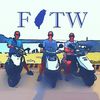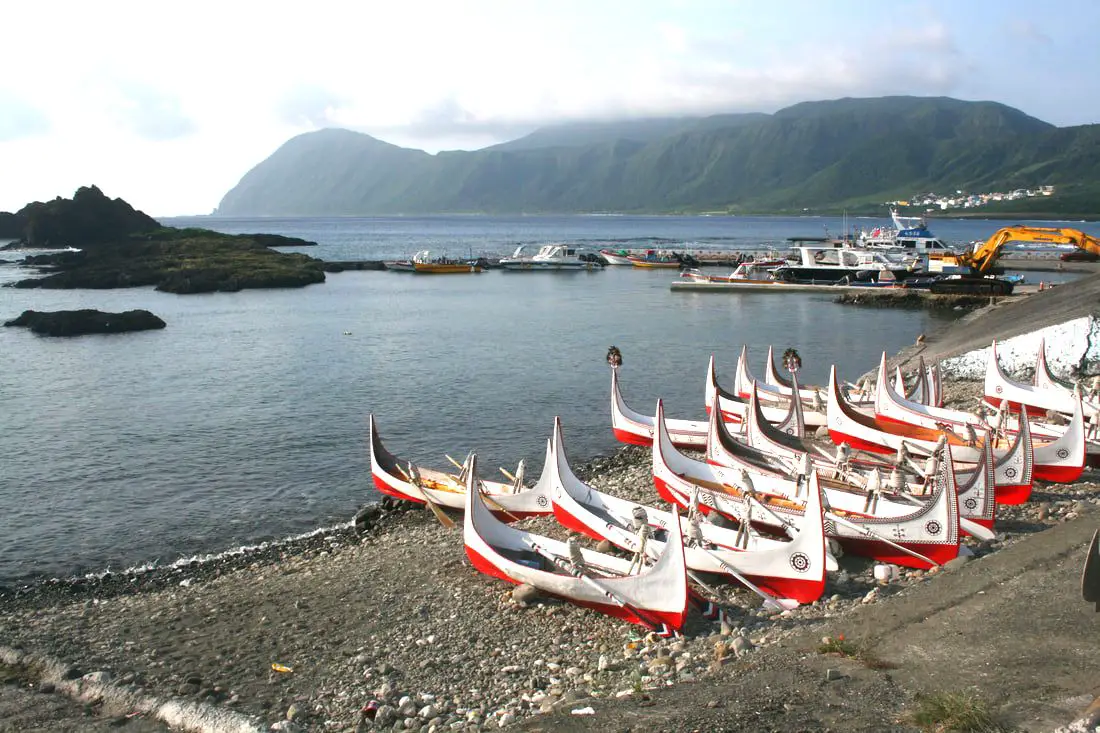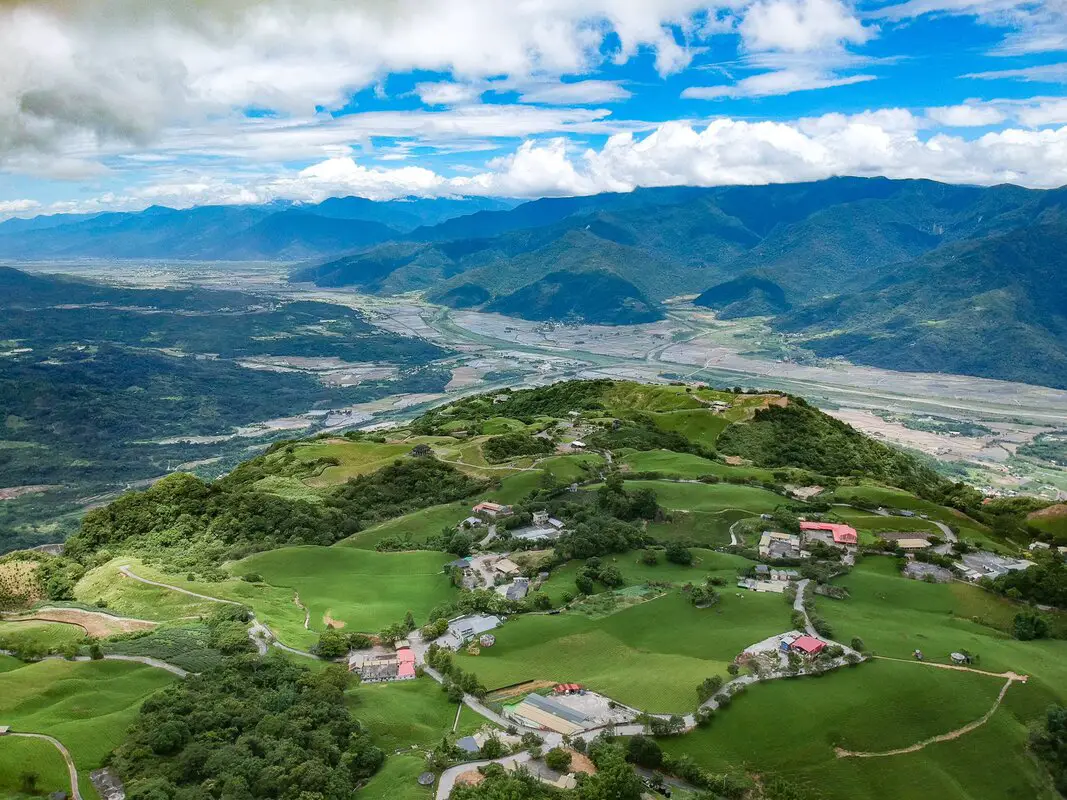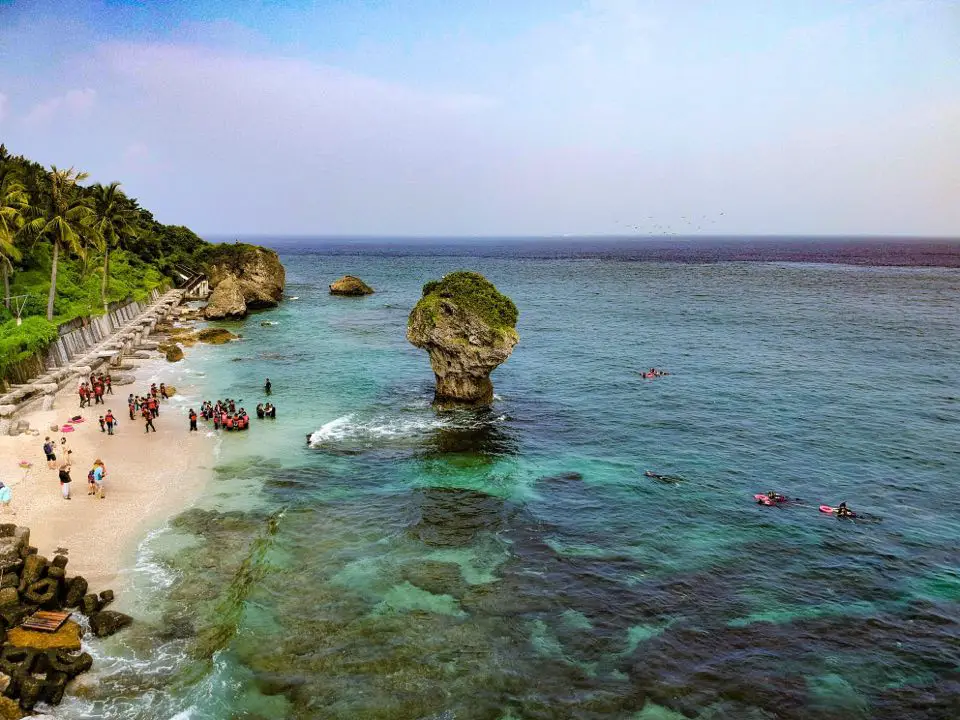|
Orchid Island (not to be confused with the Fijian Island of the same name), known in the local Tao language as Ponso No Tao (Island of the people), and in Chinese as Lanyu (蘭嶼) is a secret indigenous people's paradise off the southeastern coast of Taiwan. It is different than any other place in Taiwan, and has the best preserved indigenous culture anywhere in the country. If Taiwan's best tourist activity is experiencing the culture of Taiwan's indigenous peoples, then Lanyu has the best tourist experience anywhere in Taiwan.
Background: History: Orchid Island became inhabited about 800 years ago by the Tao indigenous people (達悟族) (aka Yami people 雅美族, which is a name coined by the Japanese, but the native people prefer Tao), which are thought to have traveled from the Batanes Islands in the Philippines, which are a little less than 200 KM away, cut off by the Bashi Channel. However, Orchid Island is very different than the Philippines. Beginning in1644, some Dutch Sailors were sent to investigate the island, and some settled there among the natives. Because of this, the Island was known as Red Head Island (紅頭嶼) by the Chinese and the Japanese. After the Dutch were defeated in Taiwan, Lanyu was claimed but not controlled by the Qing Dynasty. The Japanese claimed the Island shortly after the Sino-Japanese War in 1895, but protected it as an "ethnological research site" and forbid outsiders from entering. After the Republic of China took over Taiwan following the end of WWII, they continued to ban visitors to the island until 1967, after which tourists were allowed to enter and public schools were built there. Christian missionaries began preaching and living on the island starting in the 1950s, and now basically all native people on the island are Christian (mixed with traditional beliefs). However Christianity was introduced much earlier starting with the Dutch in the 1600s although to a lesser extent. In 1982 a nuclear waste storage plant was built on the south side of the Island without the islanders' consent, causing protests from the inhabitants. Also because of this, the Island inhabitants receive free electricity. The island is volcanic in nature, with the last major eruption being over 5 million years ago. The highest mountain is 552 meters (1,811 feet). Currently there are 2,400 people permanently living on the island, 90% of them being of native Tao descent. Tao Culture: The Tao people number about 2,000 living on Orchid Island, with about another 2,000 living on the Taiwan mainland. The Tao people rely on the sea for survival, and much of their traditions and lifestyle are centered on fishing. The Tao people are mostly Christian but also still practice many of their traditional beliefs. However their ancestral religion included a pantheon of Gods. Traditional roles for men are fishing while roles for women include harvesting taro and sweet potato and weaving. The men usually fish at night or early morning and rest on traditional wooden platforms during the day. Boats are made from planks of wood and are painted red, white, and black. The boat usually has human figures, waves, and the traditional sun image (red and black circles and sun rays) which is said to warn off evil spirits. Boats are considered sacred and the ultimate human creation. There is also a launching ceremony for new boats in which traditional clothes and headgear (such as silver helmets for men and wooden hats for women) are worn, pigs are slaughtered, and the boat is lifted into the air multiple times before being set in the water. Traditional clothes include loin cloths and vests for men, and aprons and vests for women. Young people on the street usually do not wear traditional dress. Flying Fish Festival: There are three basic seasons on Lanyu: one is the flying fish season when flying fish can be easily caught and used and lasts from February to May. The other seasons are from May to October and October to February, when flying fish cannot be caught for ceremonial use. There are many taboos during flying fish season which are discussed below. The Flying Fish Festival lasts from aboutMarch to October when flying fish are caught. During this time many ceremonies take place such as for the beginning of the festival, plentiful harvest, etc. During the festival, there are multiple migrations of flying fish species near Lanyu. There are many taboos during this time, especially when it comes to catching and eating flying fish which are the main life source of the Tao people. Weather and Climate: The island has a tropical rainforest climate, with average high temperatures between 20 and 30 degrees year round. The rainy months are in summer, especially due to Typhoons, but the most sunny days are also in summer (expect a lot of sun), and the most rainy days are in winter. Summer is the tourist season, but spring and fall are also popular times to visit. Winters are said to be dreary, cold, and have constant northeastern winds that can stop airplanes and ferries from departing to the island. When to go: The best time to go they say is around May when it is not too hot and there are no northeasterly winds or typhoons which can cancel your transportation to the island. Typhoon season lasts from around June to October. The busy season is during summer break from June to August, during which time it can be hard to book a hostel or airplane ticket. Winter is the less crowded season, but the water will be cold, there will be constant wind (which could cancel transportation), and it will rain more often. Taboos: General Taboos:
How to get there: By Plane: You can book discount air tickets from Taipei to Taitung on KKday here. The only planes to and from Orchid Island come from Taitung. Flight times: As of the time of this blog, there were six flights per day byDaily Air Corporation from about8 AM to 4 PM (Please note their website is only in Chinese). The flight from Taitung to Lanyu takes about 25 minutes. Please note that the aircraft are small and flights can be cancelled due to high winds or unfavorable weather. Costs: NT 1428 to Lanyu and NT 1360 from Lanyu. You can purchase plane tickets through a tour agency such as Klook or a similar website. By Boat: There are two places that offer ferry rides to Lanyu: Houbihu Harbor (恆春後壁湖漁港) in Pingtung and Fugang Harbor in Taitung (臺東富岡漁港). There are also two ferry companies that operate at both harbors. Both companies leave from both harbors at the same time and arrive at the same time for the same price (2300 NT per person round trip/1150 NT per single trip). Ferry Boat costs: 2300 NT per person round trip (1150 NT per single trip)from both Taitung and Pingtung. Both ferry companies have the same price. Ferry Boat Times: 7:30/7:00 AM departure, 9:30 AM arrival to Lanyu. 12:00/12:30 PM departure, 3:00 PM arrival to Lanyu. 9:30 AM departure from Lanyu, 11:30 arrival to Taitung or Pingtung. 3:00 PM departure from Lanyu, 5:00 PM arrival to Taitung or Pingtung. Both ferry companies depart and arrive at the same time to both locations. You can purchase ferryboat tickets for a discount on Klook here or KKday here. Getting around the island: Rent a scooter! The island is small so you should not need to rent a car. You can rent bicycles but you will not be able to travel as fast. You can also hire a driver to take you on tours. Ask your hostel for more rental information. They can help you book a rental in advance. Tours: You can book multiple tours and activities such as a Tribal Tour, Underground House Tour, day hiking, night hiking, snorkeling, scuba Diving, SUPing / Paddle Boarding, and Freediving. You can search for more tours through Klook here or KKday here. Scooter Rental: Price: expect 500 NT per day. You can book a scooter through Klook here or KKday here. Be sure to book your rental in advance, especially during summer weekends. Ask for help from your hostel owner if needed. I am 100% percent certain you do not need a Taiwan local license to rent scooters here, however they may ask for an international license (but I'm fairly sure they will let you rent without one). Helmet wearing is not enforced at all as you will quickly find, but it's still the law. Also be careful to not hit any goats because they wander as they please. There is only one gas station next to Kaiyuan Fishing Harbor. Car Rental: Price: expect 2000 NT per day. You can rent a car for Lanyu on KKday here. Bicycle Rental: Price: Bike rental is about 400 NT per day. You can rent a bike for Lanyu on KKday here. Accommodation: Booking accommodation on the island can be difficult in summer months and on weekends, when rooms can be fully booked for months in advance. There is a nice selection of rooms on Agoda. Here is a list of every registered hostel on the island, but it is in Chinese. My hostel required that I pay for my room in advance via bank wire transfer (this may not be an option if you are a foreign traveler, so make sure they accept credit cards if you do not have a Taiwan bank account). Expect to pay 2000 - 4000 NT per night for a standard double room on Lanyu. You can also book Wifi and SIM cards for Taiwan on Gigago here. Just to let you know, if you book using the links above, we get some commission at no cost to you, and you can help support our blog. You can click here to receive $5 USD on your first Klook purchase. Map: Please see below:
3 Comments
Taiwan's East Rift Valley has some of the most breathtaking scenery in Taiwan. It has towering mountains and vast tracks of flat rice fields. There are also amazing rivers, canyons, and waterfalls to explore. It is also home to Taiwan's International Balloon Festival. There is something for everyone in this area of Taiwan.
When to visit? The East Rift Valley is great year round, but it can get a little hot in the summer, and Typhoon season and heavy rain season last from about May to October. If you are afraid of the heat and rain then you can visit during winter when the temperatures are mild and the climate is usually dryer. Where to stay? Most of the accommodation you will find is near the city centers. If you only want to visit Hualien City or Taitung City, you can consider booking a hotel near downtown, walking or cycling around the city, and taking a bus to sites further away. We have stayed at and recommend Dream Taiwan Homestay (Agoda / Booking.com / Expedia / Hotels.com), a high quality hostel for the money in downtown Hualien, Farglory Hotel (Agoda / Booking.com / Expedia / Hotels.com), right next to Farglory Ocean Park with amazing views of Hualien, and Goldenflower B&B (Agoda / Booking.com) in Yuli right next to Sixty Stone Mountain. In Taitung have stayed at and recommend the Papago International Resort in Chishang, which is a five star hotel with private villas with pools for each room, and Mountain and Ocean B & B in Taimali, which is a quiet and affordable B&B right next to the beach. You can find out where to stay in our Taiwan hotels guide or search for the best hotel deals in Taiwan here. How to get to the East Rift Valley? You can book tickets to travel to the East Rift Valley via inter-city bus on Klook here. Book tickets via the normal train (TRA) on Klook here. Need travel insurance? Compare prices on Insubuy here. How to get around the East Rift Valley: As always, we recommend renting a scooter as the best way to see Taiwan. However, you can also a great deal of Tainan by taking the train, inter-city bus, local bus, biking, or just walking. Getting around in a car is also a convenient option as there is plenty of parking pretty much everywhere in this less crowded county. Scooter Rental: Looking for a scooter rental in Hualien or Taitung? You can search KKday here or Klook here to look for options. You can also check out our scooter rental guide here. Car Rental: If you are looking for car rentals in Hualien or Taitung, you can also search Klook here or KKDay here. You can also check out our car rental guide here. Tours: You can find more tours and activities in Hualien such as Surfing, Paragliding, SUP / Paddle Boarding, Kayaking, Canoeing, River Tracing, River Rafting, Whale Watching, Snorkeling, Diving, ATV / 4-wheeling, Paintballing, Farm Dream Estates Zoo, Water Biking, Oyster Harvesting, Shrimp Harvesting, Indigenous Experience, Glamping, Cycling, Ziplining and much more on Klook here or KKday here. You can also book Wifi and SIM cards for Taiwan on Gigago here. Just to let you know, if you book using the links above, we get some commission at no cost to you, and you can help support our blog. You can click here to receive $5 USD on your first Klook purchase.
Taiwan's outer islands are some of the most beautiful and scenic places in the whole country, and each of them can be considered a secret paradise. You can find the best beaches, snorkeling, and diving on these islands. You can also find rich and important historical sites here. Transportation may be difficult, but you will never regret visiting Taiwan's outer islands, and no trip to Taiwan should be complete without doing it.
In this blog, we will introduce the main outer islands in Taiwan that are open to tourists (there are 166 islands in Taiwan, this blog only covers a few), point out their unique traits, and compare them to each other. This way you can best prepare for your trip to the outer islands, and at the same time know what you are missing out on. All the outer Islands are great, and I highly recommend visiting them all if you can. When to visit:
How to get there:
Where to stay: Looking for a hotel? We recommend booking through Agoda here, which provides the best quality selection of accommodation on the islands. Tours: There are many tours available on the islands, including scooter rentals, boat tickets, and other activities. For more information, book with Klook here or KKday here. Map: Please see a map of the islands covered in this blog below:
Taitung has some of the most beautiful scenery in Taiwan, two amazing offshore islands, a striking coastline, deep mountains, and most of all it is bursting with unique aboriginal culture, with indigenous people making up over one-third of the population. It is an unmissable stop on your next trip to Taiwan. Here we have compiled our full guide to Taitung County.
Historical Background: Taitung has been inhabited by the Amis Aboriginal Tribe which has lived there since at least 1500 BC, and over 35% of the people that live there are Taiwan Aborigines. The area is still a center for Amis rituals and traditional ceremonies, as well as aboriginal culture. The east rift valley was also settled by aboriginal tribes such as the Puyuma which relocated from Pingtung. Qing dynasty Chinese farmers started settling there in 1875, as a reaction to the Mudan Incident of 1871 (in which a crew of shipwrecked Japanese sailors were beheaded by Taiwan aborigines) and the Japanese punitive expedition to Taiwan in 1874. After the Japanese took control of Taiwan, Taitung's main industries were growing sugar cane and rice. The eastern railway line was completed in 1926, linking Taitung to the rest of Taiwan. After the ROC took control of Taiwan, Taitung Airport opened in 1981, which further improved transportation links to the region, however, Taitung has remained relatively undeveloped when compared to the rest of Taiwan, and the population of about 200,000 has been in decline for years. However Taitung has become an important tourist destination, and the local government has invested heavily in tourism development. With its untamed and undeveloped landscape, towering mountains, beautiful coastline, and vibrant aboriginal culture, Taitung has become a tourist hot spot in Taiwan. When to go: The best time to go they say is around May when it is not too hot and there are no northeasterly winds or typhoons which can cancel your transportation to the island. The typhoon season lasts from around June to October. The busy season is during summer break from June to August, during which time it can be hard to book a hostel or airplane ticket. Winter is the less crowded season, but the water will be colder, there will be constant wind (which could cancel transportation), and it will rain more often. How to get there: By Plane: Traveling to Taitung by plane is the fastest way to get there. The trip only takes one hour from Taipei, and there are planes that leave daily through Mandarin Airlines and Uni Air. From Taitung, where you can switch to Saily Air which will take you the rest of the way to Green Island or Orchid Island. A plane ticket to Taitung takes about one hour and costs about 5000 NT per round trip. You can book discount tickets to Taitung on KKday here. You can also book cheap flights to Kinmen on Trip.com or CheapO Air. You can also search for cheap flights in Taiwan here. By Train: The train ride from Taipei to Taitung takes 3-4 hours and costs about 800 NT one way. Book tickets via the normal train (TRA) on Klook here. By Car/Scooter: From Taipei, a car ride to Taitung takes about six hours, and a scooter ride takes about eight hours. You can rent a scooter from Taitung Station on Klook or KKday. Scooter rental is about 300 NT per day. You can check out our scooter rental guide here. How to get around: Rent a scooter! Unless you are travelling with small children or elderly people you should not need to rent a car. You can rent bicycles but you will not be able to travel as fast. You can also hire a driver to take you on tours. By scooter: You can rent a scooter from Taitung Station on Klook or KKday. Scooter rental is about 300 NT per day. You can check out our scooter rental guide here. By car / taxi: You can also rent a car for about 1500 NT per day. You can rent a car on Qeeq here or Klook here. You can hire a driver or tax; you can charter a car here. You can check out our car rental guide here. By Bicycle: Cycling is the best way to enjoy Taiwan's landscapes if you have the time and energy. Looking for bicycle rentals in Taiwan? You can search on KKday here and search for tours on Klook here. You can also check out our Taiwan cycling guide here. Accommodation: Booking accommodation in the Taitung can be difficult in the summer months and on weekends. We suggest a better quality selection on Agoda.com. We have stayed at and recommend the Papago International Resort in Chishang (you can book on Agoda here, Booking.com here, Hotels.com here, or Expedia here), which is a five star hotel with private villas with pools for each room, and Mountain and Ocean B & B in Taimali (you can book on Agoda here, Booking.com here, Hotels.com here, or Expedia here), which is a quiet and affordable B&B right next to the beach. You can also find out where to stay in our Taiwan hotels guide or search for the best hotels in Taiwan here. You can also book Wifi and SIM cards for Taiwan on Gigago here. Need travel insurance? Compare prices on Insubuy here. Tours: There are many companies offering snorkeling, diving, SUPing, Surfing, Speed Boating, Glamping, River tracing, and other tours in Taitung. You can find more tours of Taitung on Klook here or KKday here. Just to let you know, if you book using the links above, we get some commission at no cost to you, and you can help support our blog. You can click here to receive $5 USD on your first Klook purchase. Map: See a map of the places we will cover in this blog below: |
Author 作家I am an American expat who has extensive experience living, working, and traveling in Taiwan. In my day, I had to learn many things about Taiwan the hard way. But I have come to learn that Taiwan is one of the best places in the world for Foreigners to live. This blog does not represent the opinions of every foreigner in Taiwan. I am just trying to help others learn more about this beautiful country. Categories
|






 RSS Feed
RSS Feed
